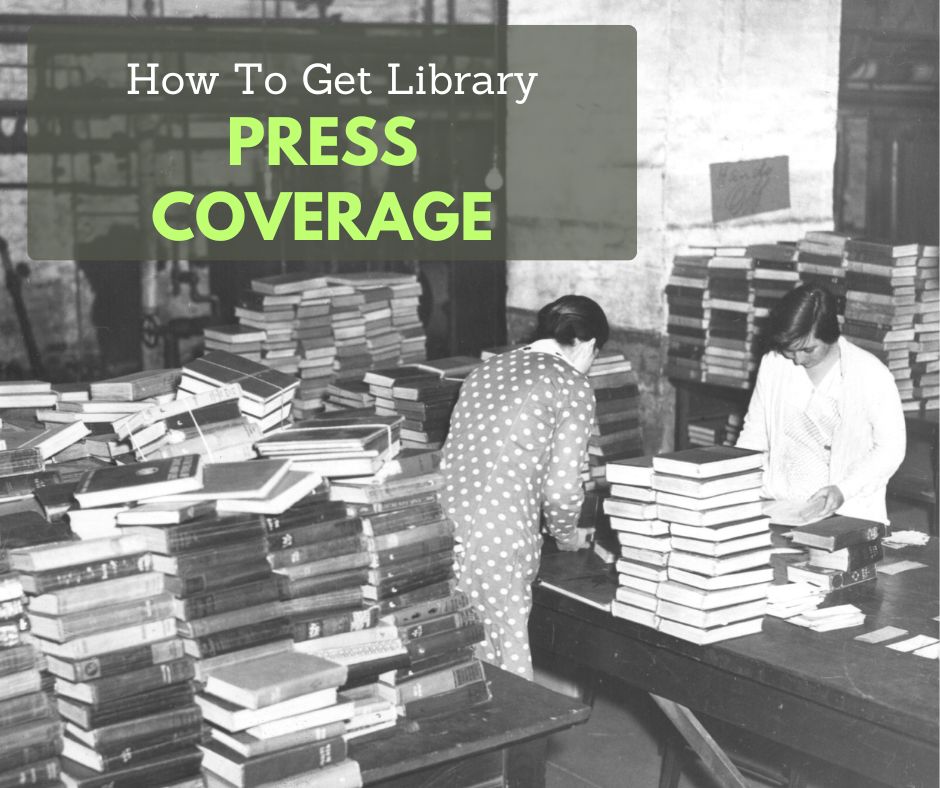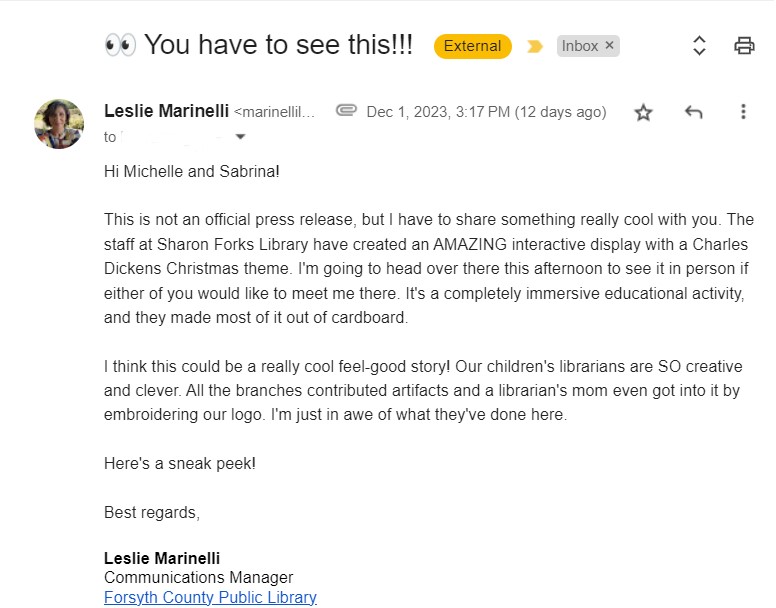
Leslie Marinelli says her happy place growing up was the Edgewood Branch of the C. C. Mellor Memorial Library in Pittsburgh, Pennsylvania. The library was right up the block from her childhood home.
“Being able to walk there and check out books on my own gave me such a sense of independence as a kid,” recalls Leslie.
When her youngest son was in elementary school, Leslie volunteered as a shelver in the school media center and “totally fell in love again with the transformative power of libraries.”
“I had been a freelance writer and editor for about 10 years and took a job as a Youth Specialist at Forsyth County Public Library (FCPL) in 2017. When the Communications Manager role was created at FCPL in 2021 I jumped at the chance to use my skills and experience to promote the library to a wider audience.”
Like many of you, Leslie is a marketing and communications department of one. A few months ago, she had an idea that was a bit outside the box. She wanted to get press coverage of an interactive display at one of her branches. The display centered on Charles Dickens and was holiday-themed.
“I typically write formal press releases for big series, special events, and major announcements,” explains Leslie. “But for this branch-specific engagement program, I thought an informal email might be more personal and effective.”

“I pitched this as a human-interest story to just one reporter and her editor. My hope was that a more casual email would stand out and not get lost in the mountain of press releases they receive daily.”
“I also really wanted to be involved in helping to shape the story, so this approach enabled me to arrange a meeting and be there to make introductions, direct the photography, and highlight the key points. And of course, I used the emoji trick I learned in your marketing class to make the email stand out in her inbox!”
“I also test all my important email subject lines at SubjectLine.com to see if there’s anything I can do to make them more effective. This one scored a 100. Again, I learned that trick from you and it has been a game changer for me.”
The subject line worked and Leslie’s work building a relationship with the media landed her a victory: The display was covered in the local newspaper (you have to be a subscriber to read the full story).
Leslie says the time it takes to build those relationships with local reporters is a worthy investment for any library, no matter the size.
“Forsyth County is a rapidly growing area, but it still has a small-town feel,” says Leslie. “Networking has been a critical part of building these relationships for me.”
“One relationship I have with a local magazine was the result of a media kit I sent to our local partners and media outlets about a big event a few years back. It contained a variety of graphics and blurbs they could copy and paste to make it easier for them to post about it online. The magazine owner liked it so much that she sent an email about it to my library director who then arranged a meeting for us. We’ve collaborated on several projects since then and she recently invited me to speak about the Library to her Rotary Club.”
“I started making those media kits about select events after seeing one of our partners copy and paste the full 2-page text of one of my press releases into a Facebook post. (The horror!) Nobody is going to read that. Community partners want to support us, so the easier we make it for them to spread the word the way we want it, the better the end results will be.”
Leslie also has some excellent strategies for managing what gets covered by local media.
“We send out a curated list of events to the local paper each week,” she explains. “I started doing this after noticing they were picking events to include that weren’t necessarily the programs we wanted to boost. Not only that, but they were getting some of the details wrong. By curating the events for them, in their preferred format, we have more control over the message, and it makes it easier for them to cover.”
Leslie also writes library-related articles for two different outlets, 400 Life and My Forsyth. (Here’s her favorite piece.) It’s a terrific way to promote the library and she says it works to satisfy her creative writing itch.
And that willingness to help her local media outlets has paid off in big ways for her library.
“I helped a freelance reporter with a couple of articles about the library a couple of years ago,” remembers Leslie. “We kept in touch and corresponded over email about library news I thought she’d enjoy. Last year she became the managing editor of the local newspaper, and she has been an invaluable resource for me. We’ve met a few times for coffee and lunch, and she let me pick her brain about how to improve my press releases.”
Leslie has four tips for any library looking to nurture a mutually beneficial relationship with the media and local partners.
Keep them informed: Invite the media to everything and follow up with them to make sure they are receiving your invitations and releases.
Make their jobs easier: In addition to the media kits for major events, create a media packet to hand out to reporters who attend your library board meetings. Include an executive summary of the topics that will be covered at the meeting, including key names, dates, and numbers, so reporters don’t have to search for answers later.
“One local reporter told me she’s never received something like this from anyone else,” says Leslie.
Another thing Leslie does is follow up with reporters after an event or meeting to email them additional details, links, name spellings, and more.
“Having your name misspelled or being misquoted is disheartening,” exclaims Leslie. “I try to do whatever I can behind the scenes to make sure everyone is happy with the results.”
Support their work: When a reporter writes something about your library or one of your pieces is published in a local magazine or blog, share it everywhere. This lets you support the media, fills your editorial calendar with great content, and builds your library’s brand at the same time.
Thank them: “I try to never miss an opportunity to thank and praise someone for writing a great article about my library or publishing one of my pieces,” says Leslie. “Email is perfectly fine for this, but a handwritten note really stands out these days. (My grandmother would be so proud of me right now for saying that.)”
Leslie says press coverage is so important—now more than ever—for helping communities (and hopefully, lawmakers) better understand the value of libraries and excellent library workers. But that’s not the only value her library sees.
“I think this kind of coverage can also be a big morale booster for staff who are in the trenches and probably don’t hear often enough what a difference they make by creating such incredible programs, displays, and positive experiences for the patrons they serve,” she says.
Leslie says her coworkers have told her that they know patrons who visited the library due specifically to the media coverage. As for the Charles Dickens display, the impact of the positive press coverage has a numeric value: nearly 1,000 more visitors came to the library than in the previous December.
Now FCPL turns its attention to other marketing initiatives including their annual report, an onboarding campaign for new cardholders, and building its presence on Facebook… again.
“We just launched a new Facebook page and changed all our social media handles to match (FoCoLibrary) due to a fruitless two-year-long battle with Meta to regain ownership of our page after a series of staffing changes,” explains Leslie. “Now that we have full control over the new page, we’re having a lot of fun rebuilding our following and connecting with new audiences!”
I always ask the library marketers I profile where they draw inspiration for library marketing. Leslie says, “At the risk of sounding like a total sycophant, I have learned so much about library marketing from you and Caleigh Haworth (my co-worker at NoveList)! In fact, I just reached out to Caleigh the other day to ask how she did that cool poll in her follow-up eBlast after the LibraryAware Summer Templates Reveal Party.”
“The Library Marketing Book Club group on Facebook has been a great source of support and inspiration. Chris Boivin at Jacksonville Public Library does a masterful job running that group, keeping morale high, and communicating with all of us.”
“I love the Southern Adirondack Library System’s Facebook page. It’s a great mix of literary humor, art, and community. They clearly got the memo that social media is supposed to be social and not a steady stream of program ads.”
“The Oklahoma Department of Wildlife Conservation’s social media strategy is the best thing to ever happen to a government agency’s public persona. I’m in awe of how funny and irreverent they are.”
“I think most library staff would be shocked to learn how much work goes on behind the scenes with such a shoestring budget to amplify the library’s story and increase public awareness. I’m grateful to have found this little corner of the internet where we can share ideas, support, and encouragement.”
P.S. You might also find this helpful
Emmy-Award Winning Journalist Shares 6 Dependable Ways To Get Press Coverage for Your Library
Subscribe to this blog and you’ll receive an email whenever I post. To do that, enter your email address and click on the “Follow” button in the lower left-hand corner of the page. You can also follow me on the following social media platforms:
